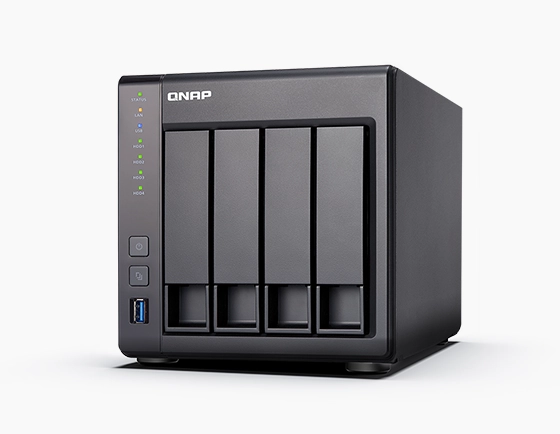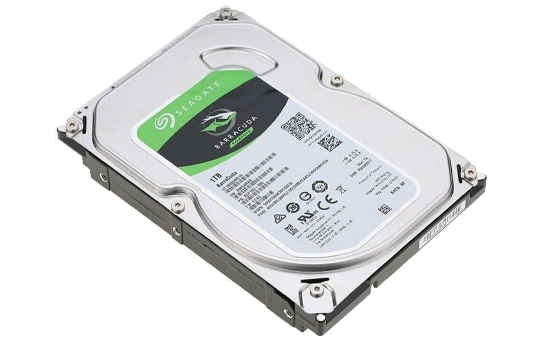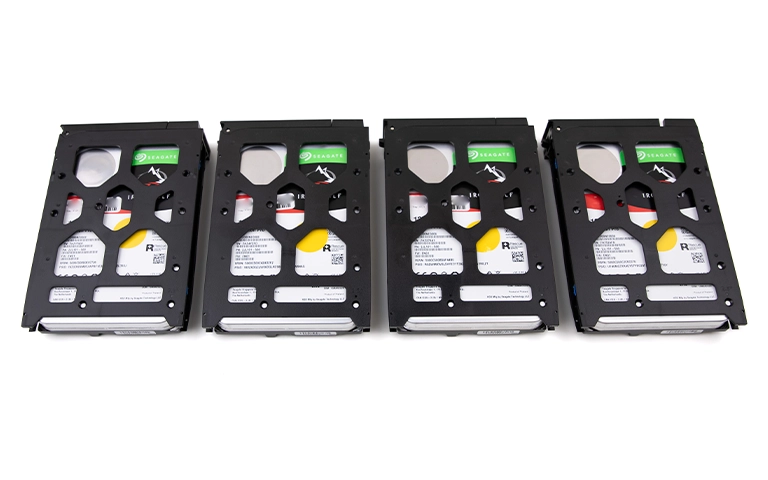A client approached us with a serious data loss incident involving a four-drive RAID 5 array built with Seagate ST4000VN008 IronWolf 4TB drives. The array was configured within a QNAP NAS, operating with thin-provisioned volumes.
After one drive failed, the NAS continued to function in a degraded state. Unfortunately, during this period of vulnerability, one of the remaining three drives was accidentally ejected. Immediately afterwards, the system reported a data error, and the entire volume became inaccessible to the user.

Trust the experts with proven results
What is a Thin Provisioned Volume?
Thin provisioning is a storage allocation technique in which logical storage space is assigned on demand, rather than reserving the entire capacity upfront. This enables administrators to create large virtual volumes without immediately consuming all available physical storage.
For instance, a 10TB logical volume can be configured on a disk group that physically holds only 4TB of data. The system allocates additional storage blocks dynamically as files expand over time.
While this approach is highly efficient for space management, it introduces significant challenges during data recovery:
File-to-block mappings are non-linear and variable
Unused space is uninitialised, reducing the effectiveness of raw recovery methods
The metadata linking logical and physical storage resides in separate system areas — if this mapping becomes lost or corrupted, the file system is extremely difficult to reconstruct
By contrast, thick-provisioned volumes allocate the entire storage capacity at creation, resulting in a more predictable and recoverable data layout during recovery operations.

Case Details
The affected volume contained critical project data, including:
Numerous .rar archive files
Individual documents in various formats
Key directories such as ISO Library and Game Development
Deeply nested folder structures that required precise preservation
The client requested that all recovered data be delivered to a single 10TB external drive, which they supplied for the final handover.
Our Recovery Process
All four drives were imaged within our ISO-certified cleanroom using forensic-grade hardware imaging systems. One drive exhibited read instability, but partial access was restored after firmware parameter adjustments and stabilisation of the head assembly.
Our engineers manually reassembled the RAID 5 array by identifying the correct drive order, stripe size, and parity rotation.
This step was critical, as automated utilities cannot interpret complex configurations when metadata is corrupted or incomplete.
Reconstructing the file system from a QNAP thin-provisioned volume required:
Interpreting QNAP’s proprietary volume headers
Rebuilding the logical-to-physical block mapping
Extracting fragmented and dynamically allocated data blocks, then aligning them to restore full file integrity
This process demanded custom in-house parsing tools and extensive understanding of QNAP’s storage architecture, which is not publicly documented.
Attempting a rebuild in such conditions can severely compromise data integrity. To understand these risks in depth, see our RAID Rebuild Data Loss Risks guide.
Once the logical volume was reconstructed, our engineers performed a comprehensive file system scan and verified all requested data. The following key datasets were confirmed and validated:
ISO Library directory
Game Development project files
The majority of .rar archives
Other nested directories and miscellaneous documents
All recovered data was transferred to the client’s 10TB external drive. The original folder hierarchy was preserved in its entirety, and a file integrity verification report was included with delivery.

Fast turnaround times for business-critical data
Recovery Results
Over 95% of the client’s requested data was successfully recovered. All critical folders and file types were restored, and the original folder hierarchy was preserved to ensure seamless navigation and usability.
The client received the recovered data in a structured and fully verified format, exactly as specified.
Summary
Recovering data from a thin-provisioned RAID 5 array presents far greater challenges than a thick-provisioned configuration. The dynamic allocation of data blocks and heavy reliance on metadata make successful recovery dependent on advanced forensic methods and in-depth proprietary knowledge.
If you experience a RAID failure, particularly in QNAP NAS environments or with thin-provisioned volumes, it is essential to power down the system immediately and avoid any rebuild or reinitialisation attempts.
To learn more about how our engineers manage complex QNAP storage systems, visit our QNAP Data Recovery Services page.
At RAID Recovery Services, we specialise in complex enterprise storage scenarios where precision and expertise are critical. Contact us if you require professional RAID, NAS, or enterprise-level data recovery performed with the highest technical standards.
